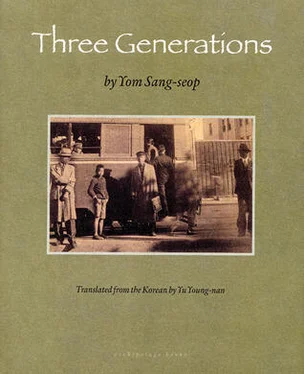Pil-sun’s head was bursting — she had to get a look at this Hong Gyeong-ae!
I may regret saying this, and I may aggravate you, but I hope Hong Gyeong-ae quits Bacchus. Nothing good will come of it if she stays there. If you love her, tell her this. And the same is true with Miss Pil-sun’s affair. I know you want to give her your guidance as a comrade, but would you give her the same advice if she were your sister or daughter?
Pil-sun’s heart leapt. Her eyes caressed every word.
You said you thought of her as a sister. But there’s a difference between as a sister and a sister, isn’t there? We should let her parents do with her as they wish. We shouldn’t interfere in her life, except to help her find the path she wants to take. It’s a sin to force a child who doesn’t have much life experience to conform to someone else’s experiences or thoughts, and to the habits they’ve picked up from the crazy world. I think all tragedies begin right there. Furthermore, should we feel contempt for a young person’s dream just because it’s a dream? It’s wrong to think that you can stop her from dreaming because she’ll wake up sooner or later anyway and will feel sad and disillusioned as a result. Why wake her prematurely from the dream of youth? Those who are older and wiser should let her dream as long as possible. Depriving someone of a dream is to take away an all-too-brief moment of happiness, for we have no other place to look for happiness than in a dream. Those who take no satisfaction in reality, or have no means to achieve satisfaction, are not happy. And even if they do find satisfaction in life, it’s not happiness but only a jumping-off point for happiness on a higher level. Isn’t hope — which aspires to greater happiness — a dream, too? It is a fantasy, a vision, a reverie. That’s why I think happiness is never truly lasting but something we happen to taste amid our discontent, as we yearn and strive in real life. If we didn’t taste it, how could we live in this troubled world?
My sermon has grown long-winded again, but please don’t disillusion a young woman who’s not even twenty. Don’t meddle with her destiny. If you’re kind, you’ll teach her to brace herself, you’ll protect her from slipping into despair when she wakes up. By the way, I read in today’s paper that a woman from a respectable Seoul family killed herself for love, creating a furor. It goes without saying that this isn’t just some noble sacrifice by a woman transfigured by love. It may reflect some character defect on her part. Physiological conditions may have also been involved, along with the influence of climate. But more than that, older people sowed the seed of tragedy by confining younger generations to their own warped experiences, thoughts, and habits. And they got what they deserved because they made the mistake of turning a blind eye to young people’s plights and didn’t teach them how to think and behave when their dreams were shattered. Is this too simple a view, too unrealistic? If my opinion and observations are right and if you really love Miss Pil-sun like a sister, you shouldn’t force her to come around to your view of society and live your way of life. If you do, it will be too extreme, too selfish an impulse, and it will negate her own existence. If she grows up and independently and voluntarily accompanies you on your path, fine — but how sad it would be if you hastily chilled a bud with frost and let it fall before it blooms! Let her dream on. Let her enjoy her youth naturally and peacefully. You might wonder why I’m so enthusiastic about Miss Pil-sun. It may be greedy for a traveler to pluck a lone flower blooming among rocks, but there’s no reason why he shouldn’t take note of its beauty. If he protected the roots of the flower with a handful of earth, onlookers might think that he has a dark design, that he’ll come later with a flowerpot to transplant the grown flower and carry it off with him. But isn’t this view too cruel?
By the time Pil-sun had read this far, her mother had twice shouted that she should finish up quickly and come to the main room. Pil-sun rushed through to the end of the letter.
It was difficult to read every page by assembling two ripped parts, but she understood what was being said about her.
In effect, Deok-gi offered to pay for her schooling, but rather than feeling glad, she was embarrassed. She was boundlessly thankful, of course, but she thought she was unworthy of such kindness. What does he see in me? He hasn’t known me long, so how can he be so kind? She reread the part about the traveler who finds a blooming flower. She pictured her own face. Am I a flower? Without having to look in a mirror, she knew that her face was pale and narrow with a pointy chin. She imagined a withered wild chrysanthemum swaying on a deserted hill after the Harvest Moon Festival in the weak sunlight. She broke into a smile at this absurd image but soon blushed at the sight of her hands. Who knew how many thousands of strangers were wearing the rubber shoes made with these very hands? Her bones had thickened and her knuckles had knotted since she began working at the factory. Ashamed of her hands when she held the overhead straps on the streetcar, Pil-sun preferred to lean in the corner while riding. In any event, these hands were trustworthy workers. Thanks to them, four or five people could eat, though not very well.
If I study, who’s going to make money and feed my family?
Dwelling on her shame over her hands, she grew frustrated with this reality.
“What’re you doing? Sitting on the cold floor?” she heard her mother shout, followed by the sound of the door to the main room opening and shutting.
Pil-sun quickly placed the two halves of the envelope, into which she had returned the folded sheets, in the drawer and finished sweeping up trash into the dustpan.
Her mother opened the door and looked in. “What’re you doing?”
“I was reading the newspapers.”
As Pil-sun left the room with the broom and the dustpan, she worried that Byeong-hwa might find out that she had read the letter.
But why did he leave it there instead of ripping it up? Did he want to show it to me?
“Why is Father late?” Pil-sun muttered as she drew a sewing basket closer to her.
“He must be out drinking with Mr. Kim again,” her mother said in a disapproving tone. They didn’t have enough to eat, not even porridge, even though they had pushed their daughter of marriageable age into the world to make a living. And yet her husband spent his time doing idiotic things like following detectives around. When he was lying low, he stayed home all day or would come home late after drinking, always at someone else’s expense, drunk and disorderly. Since her husband was almost fifty now, it would be difficult for him to land a job to his liking, but he should at least try to do something. Not a day passed without their having to worry about their livelihood. Whenever she imagined their future, she saw only darkness.
“Father’s frustrated, so he drinks.” Pil-sun sympathized with her mother, but she couldn’t bear to be harsh with her father.
“However frustrated, does it make sense for him to drink while his family has nothing to eat?”
“He drinks when someone treats him.”
“That’s right. If someone offers to buy him drinks, he should ask them to give him the money instead. What prevents him from saying that he can’t drink when his wife and daughter are starving?”
“ Egu, Mother, how can he say that? That’d be too embarrassing.” Pil-sun laughed off such an idea.
“I guess you’re right. People don’t mind buying drinks, but they scowl when they’re asked to treat someone to a meal.”
Читать дальше












